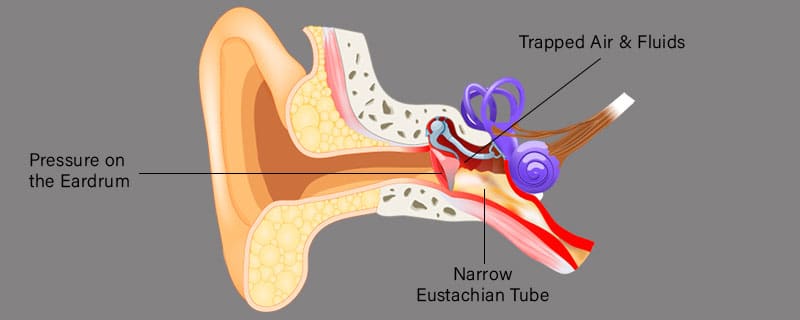
Airplane Ear (Ear Barotrauma)
During the summer months @ Lanarkshire Hearing Centre we see many patients who think their ear is blocked with wax because the cant hear or their ear is sore. When we inspect their ear, we find there is no wax. The first thing we then ask was when they last set foot in an aeroplane.Why do we ask this?
The condition known as ear barotrauma occurs when there is excess stress on your ear drum caused by change in pressure which your ear is finding it difficult to equalise.
Your middle ear is a cavity which has its own pressure system. The pressure in the middle ear should be the same as outside pressure or atmospheric. The way we manage this is by swallowing.
We have a tube in our ear that links to our throat called the eustachian tube. There is a muscle in this tube which opens and closes to allow the pressure to be maintained.
If for some reason this system is interrupted, we may experience airplane ear also known as – Ear Barotrauma, barotitis media, aerotitis media.
Your middle ear is a cavity which has its own pressure system. The pressure in the middle ear should be the same as outside pressure or atmospheric. The way we manage this is by swallowing.
We have a tube in our ear that links to our throat called the eustachian tube. There is a muscle in this tube which opens and closes to allow the pressure to be maintained.
If for some reason this system is interrupted, we may experience airplane ear also known as – Ear Barotrauma, barotitis media, aerotitis media.
Ear barotrauma is not exclusive to the pressure changes from air travel but also
Scuba Diving
Subjected to explosives
Sports injures such as boxing
Symptoms
Moderate discomfort in your ear particularly when flying
Your ear feels stiff or may even feel full
You can experience a muffled sensation in your ear and may have slight hearing loss
Severe Cases
Severe pain in the ear
You may find you have developed tinnitus, or your tinnitus has gotten worse
You may feel you have balance or vertigo issue
Your ear drum may begin to bleed
Who is at risk?
Anyone is at risk particularly if you have one of the following:| ✓ | A small and horizontal eustachian tube – Found more so in children |
| ✓ | Travelling while having the cold – Eustachian tube may not function correctly |
| ✓ | Sinus infections |
| ✓ | Hay fever |
| ✓ | If you travel while suffering from otitis media – for more info on otitis media click here |
| ✓ | While an aeroplane is taking off or landing avoid sleeping. If you sleep, you are not in control of yawning or swallowing which can help ease the pain. |
How do I prevent my ears being sore during air travel?
| ✓ | The old techniques are the best. Yawn and swallow a lot. This will work the muscles in the eustachian tube and help equal the pressure |
| ✓ | Valsalva manoeuvre (Use caution) – Pinch your nostrils and gently blow your nose. Keep the mouth closed. Repeat several times and be gentle |
| ✓ | Avoid sleeping on the plane particularly on take-off and landings |
| ✓ | Don’t fly if you have a heavy cold |
| ✓ | Use an OTC nasal spray or decongestion. Avoid overuse as overuse can increase congestion |
| ✓ | Try an otovent – otovent sends a shot of ear into your middle ear cavity to try and equalise the pressure. They can be easily found online or at some high street chemists |
If you do have the symptoms outlined above and are unsure what to do always contact your GP surgery. At Lanarkshire Haring Centre we will always give you a through ear health check and if we suspect you have a middle ear condition, we will refer you to your GP with a letter.
